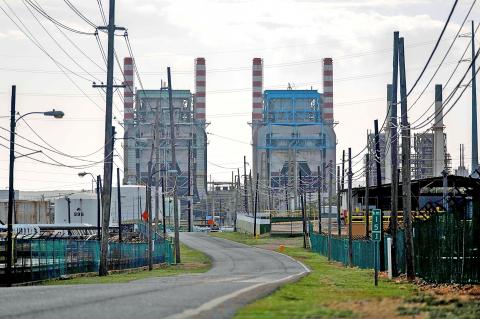The aftermath of a magnitude 6.4 earthquake that killed one person, injured nine others and severely damaged infrastructure in Puerto Rico’s southwest coast is deepening as the island’s government says it is overwhelmed.
Many in the affected area are comparing the situation to Hurricane Maria, a category 4 storm that hit in September 2017, as hundreds of families who are unable to return to their damaged homes wonder where they will stay in upcoming weeks and months as hope fades of electricity being restored soon.
“We have to remain outside because everything inside is destroyed,” said 84-year-old Brunilda Sanchez, who has been sleeping outdoors in a government-supplied cot in the southwest coastal town of Guanica. “We don’t know how long we’ll have to stay here.”

Photo: AFP
US President Donald Trump declared an emergency in Puerto Rico several hours after Tuesday’s quake hit, a move that frees up federal funds via the US Federal Emergency Management Agency (FEMA) for things ranging from transportation to medical care to mobile generators.
However, some local officials worry that the help will not arrive soon enough.
“FEMA is a very bureaucratic agency and it moves very slowly. So slowly that we’re still waiting for federal funds from Maria,” Puerto Rico Electric Power Authority director of generation Daniel Hernandez told reporters.
FEMA has already pledged to bring mobile generators to bolster the company’s biggest plant, which is near the island’s southern coast where the quake hit and is severely damaged, Hernandez said.
It is unclear how quickly the plant can be repaired, he said, adding that a damage assessment is ongoing, although some officials estimated it could take up to one year to repair.
Complicating efforts to restore power are strong aftershocks, with more than 40 earthquakes of magnitude 3.0 or higher since Tuesday’s quake, experts said.
Every time it shakes, personnel have to evacuate and further damage to the plant’s infrastructure is feared, Hernandez said.
Power company director Jose Ortiz said he expects nearly all customers to have electricity by early next week.
Preliminary assessments show that at least US$50 million in damage occurred, Ortiz said.
On Thursday, transportation officials closed a portion of one of Puerto Rico’s busiest highways because of what they called serious structural failures related to the quake.
Both directions of Highway 52, which runs from the capital, San Juan, to the southern coastal city of Ponce were indefinitely closed near Ponce.
Meanwhile, aftershocks have led to a rise in the number of people seeking shelter in southwest Puerto Rico as government officials continue to inspect homes and public housing complexes.
Puerto Rico Department of Housing Secretary Fernando Gil urged people to stay with family or in shelters if they felt unsafe in their homes as the government relocated more than two dozen people from damaged residences.
“Meanwhile, we will continue to identify what kind of help is needed to support all affected families,” Gil said.

POLITICAL PATRIARCHS: Recent clashes between Thailand and Cambodia are driven by an escalating feud between rival political families, analysts say The dispute over Thailand and Cambodia’s contested border, which dates back more than a century to disagreements over colonial-era maps, has broken into conflict before. However, the most recent clashes, which erupted on Thursday, have been fueled by another factor: a bitter feud between two powerful political patriarchs. Cambodian Senate President and former prime minister Hun Sen, 72, and former Thai prime minister Thaksin Shinawatra, 76, were once such close friends that they reportedly called one another brothers. Hun Sen has, over the years, supported Thaksin’s family during their long-running power struggle with Thailand’s military. Thaksin and his sister Yingluck stayed

Kemal Ozdemir looked up at the bare peaks of Mount Cilo in Turkey’s Kurdish majority southeast. “There were glaciers 10 years ago,” he recalled under a cloudless sky. A mountain guide for 15 years, Ozdemir then turned toward the torrent carrying dozens of blocks of ice below a slope covered with grass and rocks — a sign of glacier loss being exacerbated by global warming. “You can see that there are quite a few pieces of glacier in the water right now ... the reason why the waterfalls flow lushly actually shows us how fast the ice is melting,” he said.

FOREST SITE: A rescue helicopter spotted the burning fuselage of the plane in a forested area, with rescue personnel saying they saw no evidence of survivors A passenger plane carrying nearly 50 people crashed yesterday in a remote spot in Russia’s far eastern region of Amur, with no immediate signs of survivors, authorities said. The aircraft, a twin-propeller Antonov-24 operated by Angara Airlines, was headed to the town of Tynda from the city of Blagoveshchensk when it disappeared from radar at about 1pm. A rescue helicopter later spotted the burning fuselage of the plane on a forested mountain slope about 16km from Tynda. Videos published by Russian investigators showed what appeared to be columns of smoke billowing from the wreckage of the plane in a dense, forested area. Rescuers in

‘ARBITRARY’ CASE: Former DR Congo president Joseph Kabila has maintained his innocence and called the country’s courts an instrument of oppression Former Democratic Republic of the Congo (DR Congo) president Joseph Kabila went on trial in absentia on Friday on charges including treason over alleged support for Rwanda-backed militants, an AFP reporter at the court said. Kabila, who has lived outside the DR Congo for two years, stands accused at a military court of plotting to overthrow the government of Congolese President Felix Tshisekedi — a charge that could yield a death sentence. He also faces charges including homicide, torture and rape linked to the anti-government force M23, the charge sheet said. Other charges include “taking part in an insurrection movement,” “crime against the